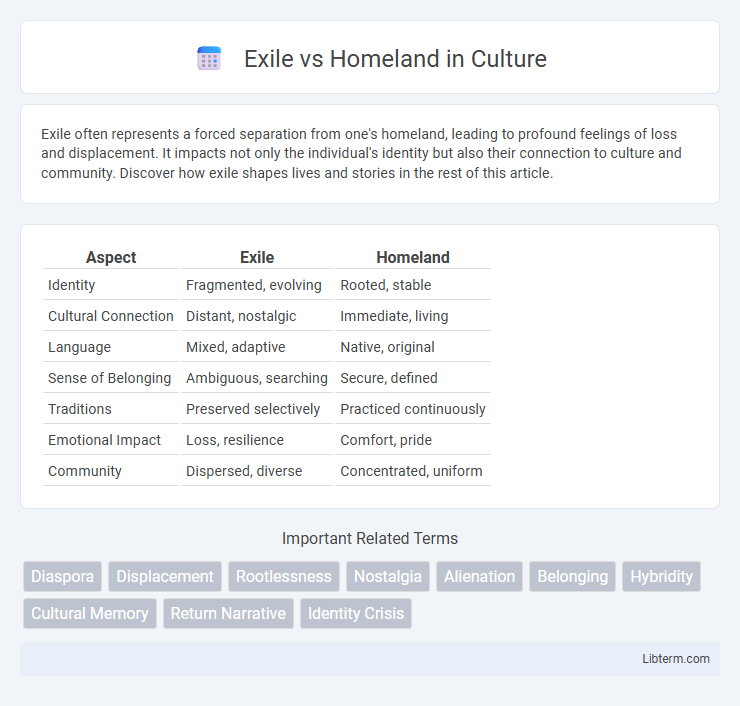Exile often represents a forced separation from one's homeland, leading to profound feelings of loss and displacement. It impacts not only the individual's identity but also their connection to culture and community. Discover how exile shapes lives and stories in the rest of this article.
Table of Comparison
| Aspect | Exile | Homeland |
|---|---|---|
| Identity | Fragmented, evolving | Rooted, stable |
| Cultural Connection | Distant, nostalgic | Immediate, living |
| Language | Mixed, adaptive | Native, original |
| Sense of Belonging | Ambiguous, searching | Secure, defined |
| Traditions | Preserved selectively | Practiced continuously |
| Emotional Impact | Loss, resilience | Comfort, pride |
| Community | Dispersed, diverse | Concentrated, uniform |
Understanding Exile and Homeland: Key Definitions
Exile refers to the state of being barred from one's native country, often due to political or social reasons, while homeland signifies the country where an individual originates or to which they feel a deep personal connection. Understanding exile involves recognizing its impact on identity, belonging, and emotional displacement, contrasting with the homeland's role in fostering cultural roots and collective memory. The dynamic between exile and homeland shapes narratives of migration, nationalism, and diaspora communities worldwide.
Historical Perspectives on Exile and Homeland
Historical perspectives on exile and homeland reveal complex narratives of displacement, identity, and belonging. Exile has often been associated with political, social, and cultural upheaval, shaping diasporic communities and influencing national histories. The concept of homeland embodies a symbolic and tangible connection to origins, anchoring identities despite physical separation and challenges of exile.
Reasons Behind Exile: Forced vs Voluntary Departure
Exile stems from either forced displacement due to political persecution, conflict, or threats to personal safety, or from voluntary departure motivated by economic opportunities, personal freedom, or family reunification. Forced exile often involves legal expulsion or fleeing imminent danger, whereas voluntary exile is a proactive choice aiming at improved living conditions or self-fulfillment. Understanding the dichotomy between compelled and elective exile reveals the complex motivations influencing the relationship between individuals and their homeland.
Emotional Impact: The Attachment to Homeland
The attachment to homeland in exile deeply shapes emotional well-being, as individuals often experience intense nostalgia and longing for familiar landscapes, cultural traditions, and social connections. This emotional impact manifests in feelings of loss, identity crisis, and a persistent yearning to reconnect with one's roots. Research shows that strong emotional bonds to homeland can influence mental health, motivating both resilience and vulnerability among exiles facing displacement.
Identity and Belonging: Life in Exile
Life in exile challenges one's sense of identity and belonging as individuals navigate the complexities of displacement and cultural dislocation. Exiles often grapple with preserving their heritage while adapting to new environments, leading to a hybrid identity that blends elements of homeland traditions and host society influences. The tension between longing for the homeland and integrating into the exile community shapes their ongoing negotiation of identity and belonging.
Cultural Preservation in Exile vs Integration
Cultural preservation in exile often involves maintaining language, traditions, and rituals as a means of sustaining identity despite displacement, fostering resilience among diaspora communities. In contrast, integration in the homeland emphasizes adopting prevailing cultural norms and participating fully in social, economic, and political life, which can lead to the gradual blending or loss of distinct cultural practices. The tension between preserving unique cultural heritage in exile and the pressures of assimilation within the homeland highlights the complex dynamics of identity, belonging, and cultural survival.
The Role of Memory: Nostalgia and Idealization
Memory shapes the experience of exile by fueling nostalgia and the idealization of the homeland, often transforming past realities into cherished, sometimes distorted, images. This recollection reinforces identity and belonging, even as physical distance separates individuals from their roots. The interplay of memory and emotion creates a psychological refuge, impacting the exiled's sense of time and place.
Political and Social Implications of Exile
Exile reshapes political landscapes by weakening dissenting voices within the homeland while empowering opposition networks abroad, potentially destabilizing existing regimes. Socially, exile fractures communities and disrupts cultural continuity, leading to identity struggles among displaced populations. The resultant diaspora often serves as a platform for political activism and transnational solidarity, influencing policy and perception in both the host country and homeland.
Return and Reconciliation: Challenges of Coming Home
The challenges of return and reconciliation in exile versus homeland contexts involve navigating complex emotional landscapes and social reintegration obstacles. Returnees often face identity conflicts, societal mistrust, and disrupted community ties that hinder reconciliation processes. Effective reintegration requires tailored support mechanisms addressing trauma, cultural reintegration, and inclusive dialogue to rebuild trust and create sustainable peace.
Exile and Homeland in Literature and Art
Exile and homeland serve as powerful motifs in literature and art, often embodying themes of identity, displacement, and belonging. Exile is portrayed as a state of loss and alienation where characters grapple with separation from their native culture, fostering narratives rich in nostalgia and resilience. Conversely, homeland represents a source of memory and cultural roots, shaping artistic expressions that explore the tension between yearning and estrangement.
Exile Infographic

 libterm.com
libterm.com